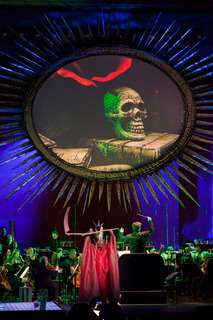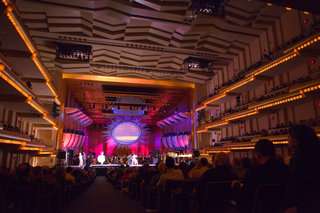|
Back
Reaching For Our Inner Funny Bone New York
Avery Fisher Hall, Lincoln Center
05/27/2010 - & May 28*, 29, 2010
György Ligeti: Le Grand Macabre
Barbara Hannigan (Gepopo), Kiera Duffy (Venus), Jennifer Black (Ananda), Renée Tatum (Amando), Anthony Roth Costanzo (Prince Go-Go), Melissa Parks (Mescalina), Mark Schowalter (Piet the Pot), Eric Owens (Nekrotzar), Wilbur Pauley (Astradamors), Peter Tantsits (The White Minister), Joshua Bloom (The Black Minister), Rob Besserer (Atmosphericist)
New York Choral Artists, Joseph Flummerfelt (Director), New York Philharmonic Orchestra, Alan Gilbert (Music Director and Conductor)
Doug Fitch (Director), Catherine Zuber (Costume Designer), Clifton Taylor (Lighting Designer), Production created by Giants Are Small

(© Chris Lee)
Standing behind a cast costumed like a marriage of an 18th Century Venetian masked ball and the Cirque du Soleil, facing a huge egg-shaped window displaying thousands of images, Alan Gilbert could barely be seen. But with all the high-tech razzle-dazzle and vocal witchcraft, this conductor was the star of György Ligeti’s fully-staged Le Grand Macabre.
For when Ligeti composed this in 1971, he was not only at the height of his powers, he was like a Nascar driver with an orchestra, creating the most exciting and absurd sounds for the most exciting and almost absurd opera. Mr. Gilbert made the brass section produce flatulence and doorbells, auto horns and brass bands. He got his timpani player to do gymnastics equaled only by soprano Barbara Hannigan at the top of her astounding range doing the same exercises. And Ligeti–for all his playfulness, tricks and legerdemain–was ever the perfectionist, longing for a perfectionist conductor like Mr. Gilbert to bring it to life.
Making the opera come to life in a concert hall, though, with an orchestra on stage, presents challenges unforeseen even by the composer. (Originally Ligeti was commissioned by the Metropolitan Opera, but opera primo Göran Genetele was killed in an auto accident, so the Met never produced it.) Obviously an opera like this, where the setting (according to the composer) is “our world of today…on the level of an absurd reality” can have infinite stagings, but the all too apparent orchestra does detract from the illusion.
In this case, director-designer Doug Fitch used two different dimensions. On stage, in front of the orchestra (and sometimes, self-consciously in the audience) were the major characters, costumed basically in 16th Century Vermeer-Rubens style costumes, with the exception of one character inside a Humpty-Dumpty egg.

(© Chris Lee)
On the back wall is that giant oval window which seems to have endless video images, usually in counterpoint to the action. Actually, the images are real, depicted through a sort of Punch-and-Judy box with pictures, objects and sometimes singers projected and moved on this oval.
That great machine, produced by the team of “Giants Are Small”, was intriguing, amusing, puzzling but always magnetic. Film director Tim Burton would doubtless find this confining, but the audience Friday night heartily chuckled (though it was difficult to know if they were emotionally amused).
Part of this was that director Fitch decided that subtitles would be unnecessary, that one shouldn’t follow the plot word by word. Yes, it was in English (Ligeti specified it should be in the language of the country), but the plot to some was incomprehensible. Easy enough to know that it was about the end of the world, as told by Tsar Nekrotzar, and that it took place in Breughelland. But after this, the cacophony of voice and orchestra allowed only the most obscene, prurient and happily insulting words to be understood.
The Punch-and-Judy, Marx Brothers, Three Stooges, Abbott and Costello fights and feuds–all of which were loved by Mr. Ligeti–were physically so jejune, so juvenile, and so silly, that physically any audience could love the opera on this level.

(© Chris Lee)
The characters, though, were almost plagiarized from Alice in Wonderland. The Black and White Ministers (boxing and batting each other down), the Astronomer, with his silly telescope and fat Queen of Spades-style wife, Prince Go-Go dressed as an egg…er chicken etc. all were fun, silly and…and……
Well, truth be told, no matter how inventive, magical, and gaudy in the best Ligeti fashion, people merely six feet tall can’t compete with a screen four times that size showing pictures ranging from the cosmos and clouds to roast chicken and abstractions. And yes, Mr. Fitch does bring the rollicking raucous chorus to the upper balcony, along with brass, and we have a parade of woodwinds and one violist through the audience as they accompany the Tsar for the end of the world.
In the long run, one must rely on the music. Forgive the comparison, but Le Grand Macabre resembles last week’s Erwartung by Schoenberg, in that it is totally a-thematic. Where Schoenberg reached for our inner torment, Ligeti reaches for our inner funny bone. And he reaches it well.
We hear shadows of Verdi (Ligeti was the ultimate parodist), slapstick (but never slapdash) comedy and screams, but ultimately the music of Marx Brothers emotions. But oh, what a cast of singers and dancers were assembled by Mr. Gilbert.
Of course Barbara Hannigan and her above-the-top-C talk-song was impossible to do, and she did it well. But from the opening grimace of Eric Owens as Nekrotzar (the Tsar of Death) to his parade at the end, we have a singer of power and fright and humor. His drunken pal Mark Schowalter, was physically and vocally vigorous. The transvestite lovers Jennifer Black and Renée Tatum intertwined their love parcels with almost bel canto desire. And then we haveour chicken, the counter-tenor Anthony Roth Costanzo, lyrically splendid–even as he is falling about the stage dressed in a giant Lewis Carroll-type egg costume.
All of if blended in somehow–somehow!!–but mainly because Mr. Gilbert made certain that the questionable physicality and very questionable language was subordinate to Ligeti’s imagination.
This was the real impact of the opera. The impact of music so audacious, so startling, with such a tsunami-full of alarming effects that even the puzzlements of screen and stage became a wonderment of inspiration.
Harry Rolnick
|